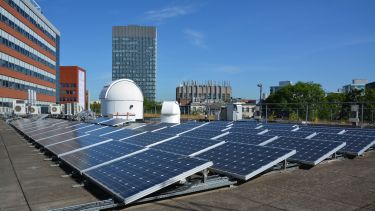Solar
Our research delivers real-world results that monitor and improve solar electricity generation and performance in the UK. We also perform cutting edge research into the development of next generation solar-cell technologies.

We monitor the generation of solar energy in the UK to further establish clean, increasingly efficient and inexpensive solar energy as a key part of the energy generation mix.
PV systems analysis
Research into solar energy generation and use at the University of Sheffield provides some of the best data the UK has about real-time estimates of the generation from the GB PV fleet to the energy industry. Our connections with the National Grid Electricity Supply System Operator (ESO) and other national partners enables us to forge a path for the reduction of the CO2 output of the UK electricity grid.
Our PV_Live system
A key part of the work of the Sheffield Solar research group is in modelling the performance of the GB solar photovoltaics (PV) fleet. Our PV_Live project provides near real-time estimates of the generation from the GB PV fleet to the energy industry. Weather variability makes GB solar electricity generation complex to model. National Grid ESO funds the project and uses the data to help balance GB electricity supply and demand.
Solar PV contributes up to 30% of the GB generation mix. To run an efficient system, National Grid ESO must know exactly how much demand and supply are connected. If they don’t, they must keep spinning-reserve on the system, burning excess CO2. Most PV systems are invisible to National Grid ESO because their generation is only metered once every 3 months. Therefore, the real-time PV generation data Sheffield Solar provides to National Grid ESO is crucial to help them run the GB electricity system more efficiently.
The data from the PV_Live system is used in a number of different ways:
- Assists National Grid ESO in balancing the electricity grid
- Estimates the carbon output of the GB electricity grid
- Provides a short term PV outturn forecast (PV_Forecast) to energy suppliers and traders to optimise their trading decisions
- We work with PV owners from the domestic, commercial and housing association sectors to offer system-level PV performance reporting.
Detailed research areas
- National and regional PV outturn
- Short term GB PV forecast
- UK PV system-level performance metrics
- UK PV fleet determination location and capacity
- PV system profiling for prospective systems
- Fleet level performance monitoring tool
Novel solar-cell materials and devices
We perform detailed research into the development of solar-cell (photovoltaic) devices based on perovskite and organic-semiconductor thin-films. Our work covers both a fundamental understanding of the basic properties of semiconductor materials and device physics, together with an exploration of the application of new solar-cell devices for mobile power applications.
- We work with UK companies looking to commercialise perovskite solar-cell devices, and are developing capability to help them manufacture their technologies.
- We are developing ultra-sonic spray-coating technologies to coat a range of substrates with solar-cell devices at high-speed and at low cost.
Detailed research areas
- Organic and perovskite solar-cell device development and optimisation
- Materials synthesis and exploration
- The use of a number of characterization techniques to characterise the structure of photovoltaic materials over a range of length-scales.
Future research
We aim to build an energy modelling platform which will enable stakeholders in the industry to access data from PV and other distributed energy resources for integrated energy management via a secure platform.
We aim to develop solar-cell devices suitable for application in a range of environments, ranging from aerospace and near-space, to automotive and indoor applications.
Contact
Get in touch: energyinstitute@sheffield.ac.uk
Follow Sheffield Solar on X
Find out more
Visit the Sheffield Solar website
View the PV_Forecast
Visit the Sheffield Electronic and Photonic Molecular Materials group page
